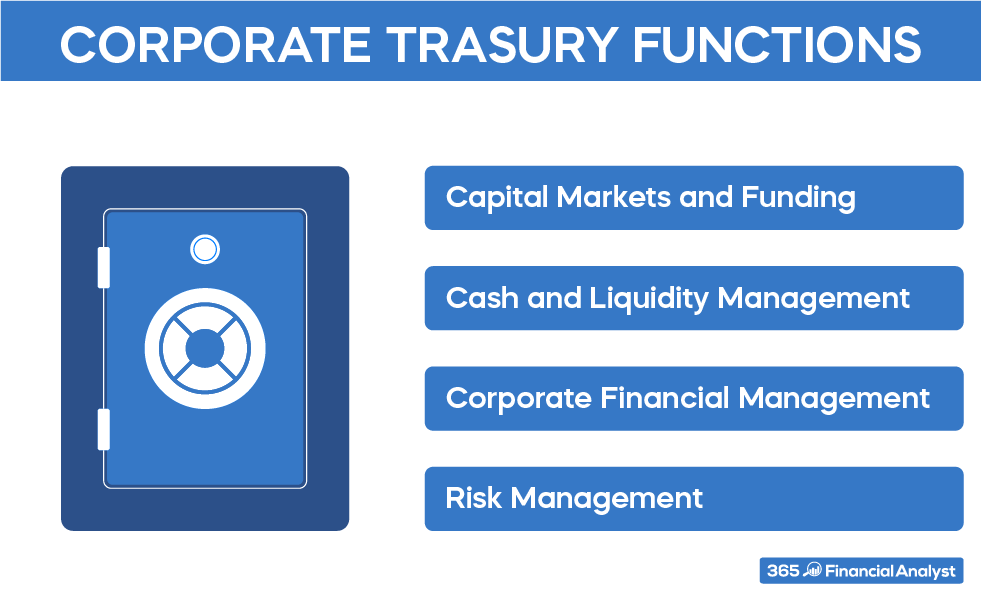Corporate Treasury: Why Do Companies Need It?
Join over 2 million professionals who advanced their finance careers with 365. Learn from instructors who have worked at Morgan Stanley, HSBC, PwC, and Coca-Cola and master accounting, financial analysis, investment banking, financial modeling, and more.
Start for Free
At the heart of corporate finance is the endeavor to manage a company’s finances in such a way that allows it to thrive in today’s fluctuating economy. If you’re interested in a career in the field, a great place to start looking will be corporate treasury. Being able to demonstrate an awareness of the key functions and challenges corporate treasury faces is enough to grab the attention of any recruiter. Putting forward viable solutions – that is guaranteed to land you the job!
What is Corporate Treasury?
Corporate treasury is a corporate function that entails managing a firm’s liquidity, funding, and capital allocation to align with the overall business strategy. It strives to ensure that a firm has the much-needed resources to manage its day-to-day operations while also formulating long-term financial strategies and policies. In addition to managing money and aligning the overall strategy, corporate treasury is also tasked with analyzing financial risks and coming up with appropriate mitigation measures.
What a company expects from its treasury departments depends on the nature of the underlying activities and responsibilities entrusted by the top management. For instance, a service company with operations in the domestic market will require little expertise in foreign exchange but will need a more sophisticated cash management system.
The extent to which a corporate treasury department initiates and develops strategies varies from one company to another. For example, in some setups corporate treasures are part of executive management, while in others they are not.
Corporate Treasury Key Functions
Below are some of the roles that define the corporate treasury function in any organization.

Capital Markets and Funding
Top on the list, corporate treasury departments are tasked with exploring all cost-effective funding options. The ultimate goal is to raise sufficient capital at the lowest cost possible to ensure a company meets its day-to-day obligations. In this case, the department must boast of sufficient expertise and experience to negotiate the best possible terms of funding.
The treasury department needs to build strong external relationships regarding capital markets and funding. It should also be able to negotiate with providers of either equity or debt. The department must also determine whether to purchase or lease an asset to save on unnecessary costs or raise some capital on the side.
Cash and Liquidity Management
Very often the treasury department is tasked with ensuring that a company’s cash needs are met in the most cost-effective way and that cash isn’t spent haphazardly. In other words, that it is only spent in alignment with formulated strategy and the agenda set by management.
Corporate treasury also ensures that large pools of cash are not left unattended or allowed to incur the unnecessary costs of unforeseen short-term borrowing. It is important to note that any money borrowed accrues interest, which is an expense that affects profit margins. Therefore, capital must be spent to generate returns that will cater to the additional costs while also adding value to the business.
Corporate Financial Management
Companies must always ensure business and financial strategies are aligned. It is the the corporate treasury department that must develop the most appropriate cost structure. Moreover, it must formulate the best way to appraise investments.
It is also the responsibility of the treasury department to ascertain whether each asset is providing the required return. If not, the assets should be disposed to save the company unwarranted costs as well as generate cash that can be spent on more valuable assets.
In addition, corporate treasury departments are tasked with ensuring all legal and tax issues are sorted out appropriately and on time.
Risk Management
While collecting and managing capital, corporate treasures are also tasked with assessing and quantifying business and financial risks a company might be exposed Appropriate risk management techniques are developed and put into action to safeguard the long-term future of the underlying business.
On this front, the focus may be on the net effect of interest rate changes and exchange rate fluctuations. Putting all the necessary hedges in place is crucial. Some of the other perils that the treasury department in any firm should be aware of include security and fraud risks as well as reputation and operational damage.
The treasury department must also understand the risk appetite of the underlying business and ensure that management and shareholders are on the same page.
Treasury Operation and Controls
Corporate treasury would live up to expectations based on its performance of the key functions outlined here. In this sense, the focus should always be on managing treasury departments and their functions to foster the core business.
Effective communication among all the departments involved is essential if the treasury is to meet the goals it has set in the collection and management of capital while also mitigating against any potential risks.
Key Challenges Facing Corporate Treasury
Globalization
The world has become a global village thanks to widespread digitization. Businesses and companies have been forced to expand into new markets and domains, placing an extra burden on the treasury department to scale and support rapid growth.
Expanded Role
Unlike in the past, corporate treasurers today have to contend with extra duties owing to the rapid growth that most businesses and companies are undergoing. For instance, handling foreign exchange and foreign investments are some of the expanded duties that corporate treasurers are called to perform.
Cybersecurity Risk
Globalization has also given rise to cybersecurity risks that corporate treasures must factor in. The risk of always having to circumvent hackers and fraudsters is one that comes with operating on a global scale. Dynamics in the global landscape are also constantly changing, posing new risks that the corporate treasury department must be well prepared to address.
What’s Next?
The role of corporate treasures is constantly evolving as digitization gives rise to new opportunities and challenges. Corporate treasures need to be well versed in the global financial markets if they’re to stay a step ahead of the unscrupulous dealers looking to take advantage of the slightest of loops. In addition, modern and proven risk management and hedging strategies must be implemented if a business is to safeguard its capital and utilize it efficiently. Learn how to tackle these and other corporate treasury issues with our updated Corporate Finance Course!
Ready to take the next step towards a career in Finance?
From foundational topics in Accounting and Financial Analysis, through Corporate Finance and M&A, to specialized Fintech and Economics courses, the 365 Financial Analyst curriculum is designed to prepare you for the world of Finance as it is today. Whether you are a total beginner or a working professional, our expert-led courses offer the opportunity to upskill at your own pace. Find the right fit for you and start learning today!
